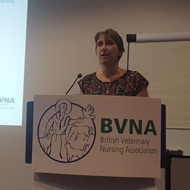Travelling pets and the UK's disease risk

Joy Howell speaking at BVNA Congress.
Dogs should be treated for tapeworms before, during and after travel - not just prior to re-entering the UK, said Joy Howell at BVNA Congress, as she outlined the key disease threats to the UK.
Increasing pet travel, importation, and the expanding distribution of current vector-borne diseases, are responsible for the rising threat of exotic diseases becoming established in the UK, Howell said.
Emerging threats to be aware of include skin worm, which has been detected in North West England; oriental eye worm, of which there have been three UK cases; oesophageal worm, of which there have been two unexplained cases in the UK; Linguatula serrata, which has affected at least six dogs imported from Romania; and tick-borne encephalitis, which is moving west.
Since the Pet Travel Scheme was updated in January 2012, tapeworm treatments must be administered one to five days before entering the UK, and tick treatments are no longer required at all. As a zoonotic disease, Echinococcus multilocularis (or fox tapeworm) is of particular concern, though it is not currently present in the UK.
While tapeworm treatments are still required, Howell points out that the Pet Travel Scheme is designed to protect human health, not animal health. There is a potential window for treated animals to become reinfected, so they should be treated again within 30 days of returning home. This is also recommended by ESCCAP UK and Ireland.
Appropriate tick treatment is also required to prevent diseases such as Lyme disease, Ehrlichiosis and Babesiosis. But in addition to tick products, owners should also be advised to check their animal regularly for ticks, and use a tick hook for prompt removal, in order to reduce the risk of disease transmission.
It's important not to forget the implication of travelling to other parts of the UK, where there may be different risks.
Veterinary nurses in the audience were advised to look at ticks they remove from animals in practice and consider submitting them to PCR for disease. Ticks can be sent to Sarah Cutler at the University of East London, Public Health England, or, for identification, the University of Bristol.
Generally, travelling cats are far less affected by vector-borne disease than dogs. The main concern is heartworm, for which a monthly treatment can be administered.
The main points given in the lecture were; provide clients with the right advice on travel, encourage appropriate parasite treatment - going above and beyond the requirements of PETS - and swift removal of ticks. Further information can be found on ESCCAP's website: www.esccap.org.uk



 The Veterinary Medicines Directorate (VMD) is inviting applications from veterinary students to attend a one-week extramural studies (EMS) placement in July 2026.
The Veterinary Medicines Directorate (VMD) is inviting applications from veterinary students to attend a one-week extramural studies (EMS) placement in July 2026.